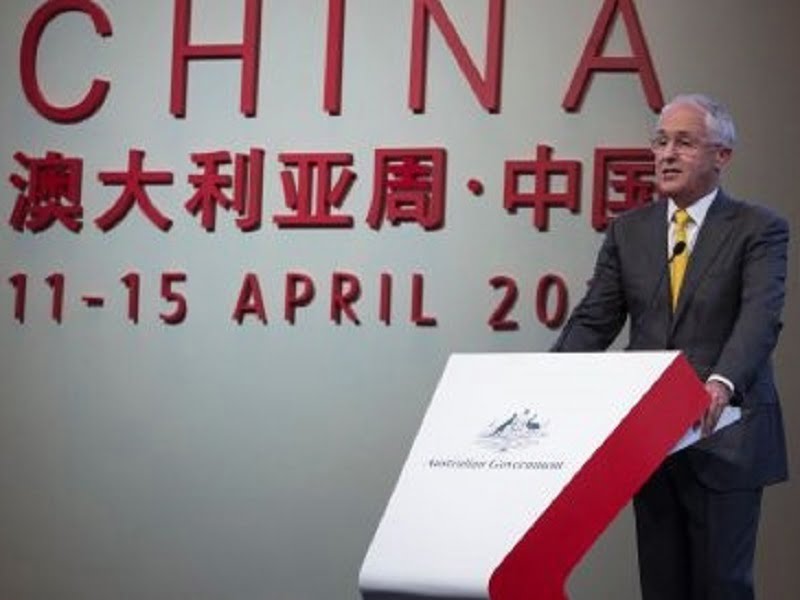The Innovation stream for government’s ambitious Australia Week in China program running this week may not have been the most popular on the massive eight-city caravan that has seen about 1,000 business people and dozens of bureaucrats criss-crossed China.
But Malcolm Turnbull gave his favourite topic plenty of air during his first ever (and very much by-the-numbers) speech in the Middle Kingdom as Prime Minister on April 14.
“… the challenges and opportunities presented by these deep structural changes explain why every element of my government’s economic plan is working to continue our successful transition to a stronger, more diversified, more innovative 21st century economy”, he said.

“Everything we’re doing, innovation, competition, trade and infrastructure is focused on powering jobs and economic growth.”
The PM was addressing about 2,000 Australian and Chinese business people and bureaucrats at the Shanghai expo site.
As usual, the Prime Minister was terrifically excited. This time, to be in China and in Shanghai, the city which is the heart-beat of Chinese commerce and its roulette wheel-like stock market.
“It’s great to be back in Shanghai, here at the heart of the most exciting economic transformation of modern times. A city Lucy and I have visited many times, on business, on holiday, visiting our son Alex when he was studying Chinese here at the Jiaotong University, in 2001,” Mr Turnbull said
Only 94 delegates registered to attend the Innovation Program, much less than the wildly popular Premium Food & Beverage Program which featured a strong e-commerce component and attracted almost 300 delegates. Other streams, such as Agribusiness, Health and the Tourism “VIP” Program also attracted more people.
Interestingly, given Mr Turnbull’s near obsessiveness on the topic, neither Innovation and Science Minister Christopher Pyne nor Assistant Minister for Innovation Wyatt Roy made the trip this week. Mr Roy’s office insists he was never planning to attend.
But the real push for more dollars from China can be seen in which Ministers attended the week alongside Mr Turnbull (the encore performance), and Australia trade duo of Steve Ciobo (Minister) and Andrew Robb (Special Envoy). They were Resources Minister Josh Frydenburg (which Australia is mobbing away from its reliance on mining, it is, of course, more important than ever) and Tourism and International Education Minister Richard Colbeck.
“Last year more than one million Chinese visitors holidayed in Australia, spending more than $8 billion. And now that China has proclaimed, next year together with us to be the ‘Australia-China Year of Tourism,’ I can safely wager that our hotels, our restaurants, our tour operators will soon be investing in new capacity to meet that new demand,” Mr Turnbull said.
“We’re doing our bit by introducing streamlined and online visa processes. This morning I launched Tourism Australia’s new digital platform, opening up on the 700 million smart phones here in China the prospect of an exciting visit to Australia.”
It’s worth noting that Mr Robb joined the Premium Food and Beverage Program at Alibaba headquarters in Hangzhou on April 13, where the ecommerce giant confirmed that it is opening an office in Australia.
“Globalisation is a core strategy for Alibaba Group and it will be for the decades to come. As one of our key markets, Australia clearly plays a key part in this strategy,” Alibaba vice-chairman Joe Tsai, who hosted the delegation, said.
“With the services and the hundreds of millions of user base that Alibaba has to offer, we are well positioned to further expand our collaborations with global businesses from around the world in bringing premium quality goods from different countries to our Chinese consumers,” Mr Tsai said.
Maggie Zhou, Managing Director for Australia and New Zealand at Alibaba Group added: “Australia is well-known as the origin of high-quality organic goods, such as baby and maternity products, health and nutrition, and fresh foods.”
“These categories are among our top-selling international product categories, and are sought-after by many consumers in China. We are committed to work(ing) with Australian merchants to continuously expand the range of product selection to better serve the needs of Chinese consumers,” Ms Zhou said.
Still there has been some bad news in Australia-China trade too, most notably the collapse of steelmaker and miner Arrium, largely due to cheap Australian iron ore, which is allowing China’s steel mills to keep producing product that it is increasingly dumping on global markets.
Then there was the nasty shock that hit Australian diary and health supplement groups when Chinese authorities, literally overnight, announced new restrictions on cross order ecommerce.
“We look forward, as I am sure do Chinese consumers, to the implementation of recent changes affecting ecommerce imports so that trade can continue to grow for mutual benefit,” Mr Turnbull said.
With agriculture the biggest innovation hotbed to hit Australia for years, the construction of 12 new multi-billion dollar submarines in Adelaide will go unremarked, at least by Mr Turnbull, if not the Chinese.
But the biggest threat to Australian trade with China – and the opportunities at present outweigh the risks – is China’s proclivity to link diplomacy with trade.
The Communist Party’s English language mouthpiece, the China Daily, said Mr Turnbull needed to be “careful and considerate about Canberra’s stance on the South China Sea”.
Do you know more? Contact James Riley via Email.
